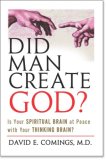Mysticism represents a sense of knowing that emanates from the spiritual brain. During a mystical experience there is a profound transfiguration of self, time, and space and often a feeling of having a direct union between the Soul and God or with the absolute truth. Knowing based on mysticism is the antithesis of reason because it cannot be objectively verified. It is the stuff that faith is made of. Because it often emanates from the temporal lobe, hippocampus and amygdala, it has a consuming emotional flavor and is believed to be real and true with far greater fervor and conviction than rational knowledge. It is so powerful that some have felt that without it, religions based on reason alone are likely to fail. Without the intermittent emanations from the spiritual brain in many different individuals across the centuries and the world, it is unlikely that any of the formal religions as we know them now, would exist.
While mystic ecstasies are usually the purview of a select few, many methods have been developed such as meditation, yoga, prayer, dance, swaying, rituals, fasting, speaking in tongues, and the taking of psychedelic drugs – to make a semblance of this mystical experience available to the common man. ‘Knowledge’ based on mysticism is likely to be defended with far greater passion than knowledge based on reason and therein lies its danger, since it can easily form the stuff of despots, wars and terrorism.[p540]

